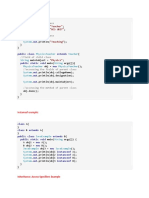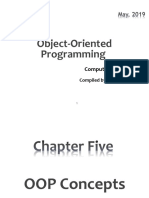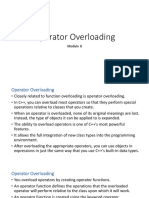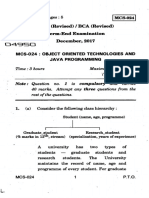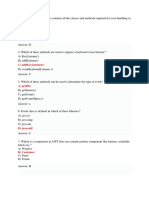Encapsulation:
class Animal2 {
String name;
public Animal2(String name) {
this.name = name;
}
public void Sound() {
System.out.println(name + " is making a sound");
}
}
class cat1 extends Animal2{
public cat1(String name) {
super(name);
}
@Override
public void Sound(){
System.out.println(name + " is meowing");
}
public void fetching(){
System.out.println(name + " is fetching the ball");
}
}
public class encapsulation {
public static void main(String[] args) {
Animal2 dog = new Animal2("Husky");
dog.Sound();
cat1 c = new cat1("calico");
c.Sound();
c.fetching();
}
}
Output:
�Inheritance:
class base{
private int x;
public int getX(){
return x;
}
public void setX(int x){
System.out.println("Setting x as ");
this.x= x;
}
public void printMe(){
System.out.println("an example of constructor");
}
}
class derived extends base{
private int y;
public int getY(){
return y;
}
public void setY(int y){
this.y= y;
}
public void sqrt(){
System.out.println("the square = " + (y *y));
� }
}
class Animal1{
String name;
public Animal1(String name){
this.name =name;
}
public void sound(){
System.out.println(name + " is making sound");
}
}
class Dog1 extends Animal1{
public Dog1(String name){
super(name);
}
@Override
public void sound() {
System.out.println(name + " is barking");
}
public void fetch(){
System.out.println(name + " is fetching a ball");
}
}
public class inheritence {
public static void main(String[] args) {
Animal1 cat = new Animal1("Persian");
cat.sound();
Dog1 dog = new Dog1("Golden Retriever");
dog.sound();
dog.fetch();
base b = new base();
b.setX(98);
System.out.println(b.getX());
b.printMe();
derived d = new derived();
� d.setX(78);
System.out.println(d.getX());
d.setY(45);
System.out.println(d.getY());
d.printMe();
d.sqrt();
}
}
Output:
Interface:
interface Bicycle{
int a = 45;
void applyBrake(int decrement);
void speedup(int increment);
}
interface Horncycle{
void applyhorn();
void horn();
�}
class Avoncycle implements Bicycle, Horncycle{
int speed =7;
public void applyBrake(int decrement)
{
speed = speed - decrement;
System.out.println(speed);
}
public void speedup(int increment){
speed = speed + increment;
System.out.println(speed);
}
public void applyhorn(){
System.out.println("press horn");
}
public void horn(){
System.out.println("stop it");
}
public void newn(){
System.out.println("for testing");
}
}
public class interfaces {
public static void main(String[] args) {
Avoncycle ch = new Avoncycle();
ch.applyBrake(3);
ch.speedup(4);
System.out.println(ch.a);
ch.applyhorn();
ch.horn();
ch.newn();
}
}
Output:
�Abstraction:
abstract class parent{
public parent(boolean name){
if(name)
System.out.println("This is a constructor");
}
public void sayHello(){
System.out.println("Hello");
}
abstract public void greet();
abstract public void shake();
}
class child extends parent{
// to avoid printing the constructor we need to create a constructor of extended
class
// and use super() to if needed
public child(){
super(false);
}
@Override
public void greet() {
System.out.println("Greeting");
}
public void shake() {
� System.out.println("Shaking");
}
}
//to extend a class we must do
// 1. make the extended class an abstract class or
// 2. override the abstract method of the abstract base class
// class child2 extends parent{
// public void nod(){
// System.out.println("this will show an errer");
abstract class child2 extends parent{
public child2(){
super(true);
}
public void nod(){
System.out.println("Nodding");
}
abstract public void greet2();
abstract public void greet3();
}
public class abstraction {
public static void main(String[] args) {
// parent p = new parent() ; error
// child2 ch = new child2(); error
// we can't create an object of a abstract class
child c = new child();
c.greet();
c.shake();
}
}
Output:

















